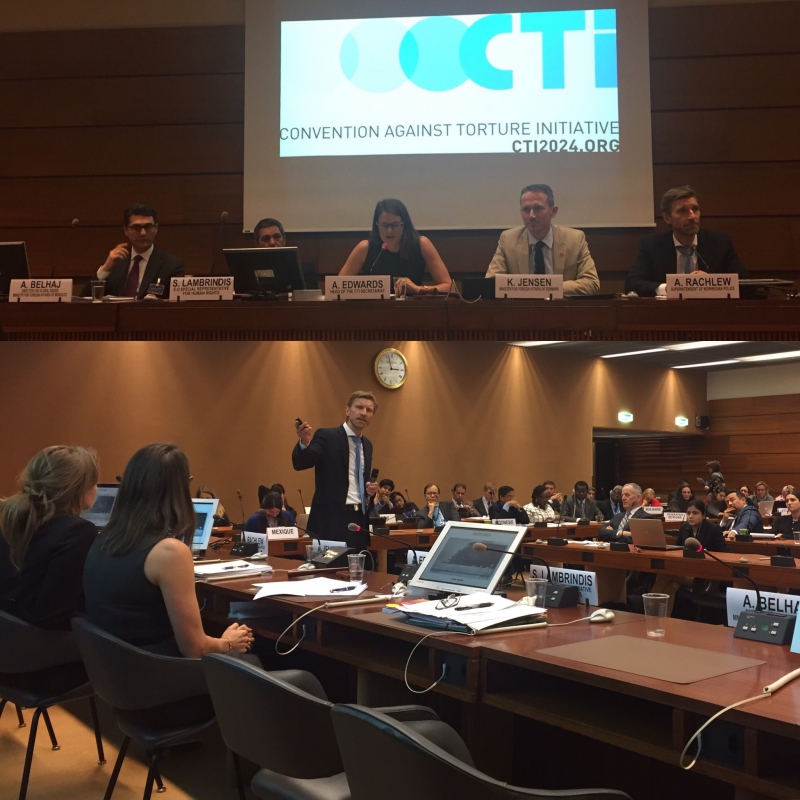CTI panel shares practical torture prevention techniques in policing
Geneva, 1 March 2016 – In the margins of the opening week of the 31st session of the Human Rights Council, more than 80 participants from 37 States, international organisations and civil society organisations attended a CTI side event where a high level panel and a subsequent open floor discussed how torture can be prevented in police custody.

At a CTI high level panel moderated by Dr. Alice Edwards, Head of the CTI Secretariat, the Danish Minister for Foreign Affairs, Kristian Jensen, EU Special Representative for Human Rights, Stavros Lambrinidis, Moroccan Director for Global Issues, Mohammed Amine Belhaj, and Superintendent of the Norwegian Police, Asbjorn Rachlew, gave their views on measures to prevent torture in police custody.
Mr. Jensen stressed that torture in police custody reflects a real, everyday problem in all regions of the world and that the early phases of police custody are where torture and ill-treatment are most often committed. The adoption and implemention of prevention stragies have shown to improve significantly the credibility of criminal justice systems. Only then can fundamental rights such as the right to a fair trial, the right to remain silent and to be presumed innocent be enforced.
Mr. Lambrinidis spoke about EU initiatives and approaches on strategies to fight torture. Lambrinidis underscored the importance of creating a sense of ownership of the anti-torture agenda both in individual states but also within regional settings. Ownership was crucial to create an environment of sustainable security which would ultimately lead to a non-violating culture.
Lambrinidis stressed that within the EU great emphasis was placed on walking the walk and building alliances across nations. The EU approached the issue of torture prevention in early phases of detention through different strategies:
- Change of confession based justice systems;
- Securing strong political will from both government as well as judiciary in implementing anti-torture laws;
- Using modern technology inside and outside of interviewing rooms;
- Establishing effective and independent complaints mechanisms for redress, including providing access to independent doctors who are trained to assess allegations of torture;
- Monitoring progress and procedures, both at the national level as well as signing up to regional and international monitoring systems;
- Training of police and law enforcement.
Drawing from the outcome of a CTI meeting held in Morocco in December 2015 where MENA States discussed the same topic, Mr. Belhaj shared some key observations, including that
- Safeguards – such as access to a lawyer, the notification of family members of the whereabouts of persons arrested or detained and audio or video recording of interviews – are necessary to not only protect persons arrested and detained but also law enforcement officers against false allegations;
- There is a need to move away from a “confession culture” where confessions are seen as the only means to solve a crime;
- Greater investment in training of police is essential;
- Accountability is ensured by carrying out independent and impartial investigations of torture by public officials;
- Political will such that States adopt a zero tolerance policy for torture.
Dr. Rachlew, a seasoned detective with eight years in homicide, concluded the panel by providing a practioner’s perspective on methods to prevent torture in police custody and drew participants’ attention to the Norwegian experience in implementing the concept of investigative interviewing techniques. He encouraged States to be open to research in testing and trying new ways to improve criminal investigation.
In particular, Rachlew emphasized that the aim of investigative interviews with suspects (as well as victims and witnesses) is to collect accurate and reliable information to disclose the truth about events; it is not about obtaining information that reinforces the assumptions already held by officers. He highlighted the ease with which technology can assist police, mentioning that video recording not only protects police officers but also preserves the oral evidence.
A vibrant discussion followed, with participants and the panel sharing experiences on the use of body-worn cameras, how to protect suspects during the hours before formal arrest, how to ensure access to legal representation in remote or rural areas, and evidentiary rules on admission.

